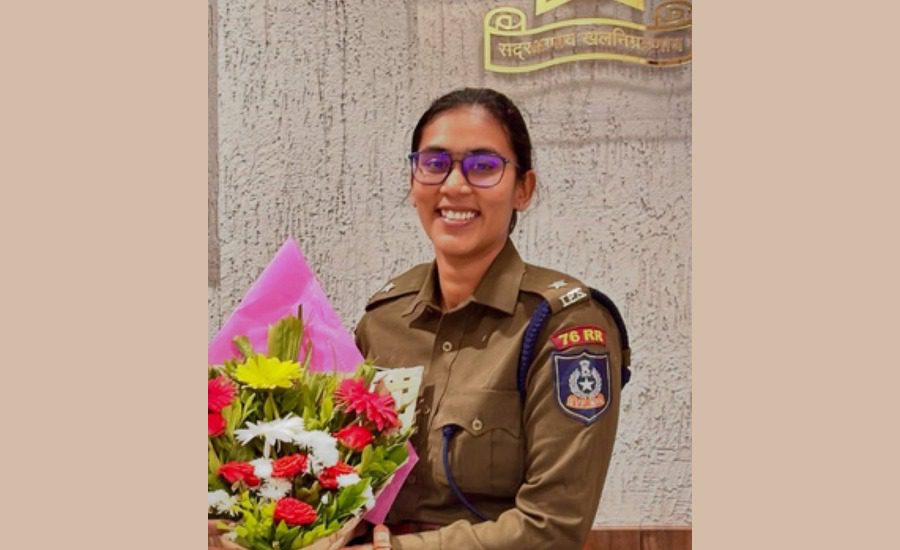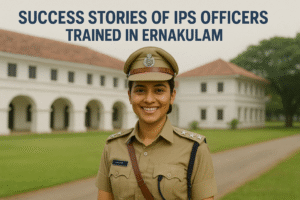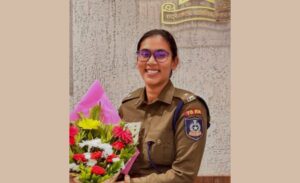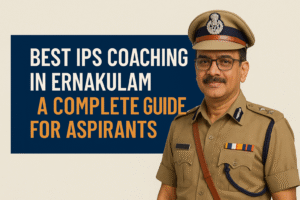Introduction
In the often challenging world of law enforcement, stories of integrity and resolve shine especially bright. IPS officer Anjana V. S. (often referred to as Anjana Krishna) is one such example. Her rise from a modest upbringing in Kerala to serving as a Deputy Superintendent of Police (DSP) in Solapur, Maharashtra, and her recent stand during an anti-illegal mining operation, have made her a subject of admiration and inspiration.
Early Life & Education
Roots in Kerala: Anjana hails from Thiruvananthapuram, Kerala. Her family’s background is modest — her father runs a small cloth shop, and her mother works as a typist in a court.
Schooling & College: She attended St. Mary’s Central School, Poojappura. For higher education, she pursued a Bachelor of Science in Mathematics at NSS College for Women, Neeramankara.
UPSC Success: In the 2022–23 Civil Services Examination, she secured All India Rank 355, which paved her way into the 2023 IPS batch.
Career & Posting
Cadre: Anjana belongs to the Maharashtra cadre.
Current Role: She serves as Deputy Superintendent of Police (DSP), stationed at Karmala (Karmala Tehsil) in the Solapur District of Maharashtra. She’s known for being committed, principled, and having a reputation for integrity.
The Viral Incident: Standing Up in Solapur
One of the most widely reported events involving Anjana recently took place during an anti-illegal mining operation in Kurdu village, Madha taluka, Solapur. Here are the key points:
Call to Action: Anjana led a team of police/revenue officials to stop illegal excavation (of soil/sand) for road construction, based on a complaint. Villagers allegedly claimed Gram Panchayat permission but couldn’t produce the relevant papers. Political Pressure & Response: During the action, a worker connected to the Nationalist Congress Party (NCP) handed Anjana a phone, saying Maharashtra Deputy Chief Minister Ajit Pawar was calling. She did not immediately accept the request to stop enforcement. She asked the caller to call her directly on her own number so she could verify identity.
Video Call & Escalation: Ajit Pawar then reportedly made a video call to her, insisting she stop the operation and coordinate with the local Tehsildar instead. The matter lasted around three hours, with Anjana not backing down until it was confirmed that there were no valid permissions for the excavation.
Public Reaction: The video of the exchange went viral. Many praised her for standing firm, doing her duty despite political pressure. Some saw it as a sign of bureaucratic courage. Others debated the limits of political oversight vs. administrative independence.
Significance & Lessons
Integrity in Practice: Anjana’s insistence on verification before obeying what could have been an inappropriate request underscores the importance of due process in public service.
Role Model: For many young people, especially from underprivileged or middle-class backgrounds, her journey is a reminder that perseverance, education, and ethical commitment can lead to significant public roles. The fact that she comes from a modest family amplifies the value of her achievement.
Balancing Politics and Administration: The incident exemplifies a recurring tension in India between political authority and law enforcement autonomy. It raises important questions: When should political leaders intervene? To what extent should officers comply? And how should officers protect their ability to act lawfully under pressure?
Challenges & What’s Next
Though Anjana has gained much acclaim, there are always challenges:
Sustainability: Prolonged resistance to political pressure can bring its own difficulties — transfers, bureaucratic resistance, or being caught in political crossfires.
Systemic Support: Officers like Anjana need clear institutional backing, transparent rules, and public awareness so that forceful, but lawful, actions are not undermined.
Public Expectations: When someone becomes a symbol of integrity, expectations are high. Managing those while doing everyday administrative work is tough.
How to become an IPS officer?
Becoming an IPS officer (Indian Police Service) is a prestigious achievement and involves a rigorous selection process. Here’s a step-by-step guide on how to become an IPS officer in India:
🧭 Step-by-Step Process to Become an IPS Officer:
1. Meet the Basic Eligibility Criteria
Nationality: You must be a citizen of India.
Age Limit (General Category):
Minimum: 21 years
Maximum: 32 years
Relaxation for OBC (3 years), SC/ST (5 years), etc.
Education: A Bachelor’s degree in any discipline from a recognized university.
2. Appear for the UPSC Civil Services Examination (CSE)
The IPS is recruited through the Civil Services Exam (CSE) conducted by the Union Public Service Commission (UPSC).
UPSC CSE has 3 stages:
📝 Stage 1: Preliminary Examination (Prelims)
Objective type (MCQs)
Two papers: General Studies (GS) & CSAT
Only qualifying in nature; marks not counted for final ranking.
Held around May/June each year.
🧠 Stage 2: Mains Examination
Descriptive (essay-type)
9 papers (2 qualifying, 7 counted for merit)
Includes subjects like Essay, General Studies, and optional subject.
Held around Sept/Oct.
🗣️ Stage 3: Personality Test (Interview)
Conducted for candidates who clear Mains.
Assesses personality, leadership, presence of mind, and suitability for civil services.
Held in March-April.
3. Secure a High Rank
The IPS is one of the top services allotted through the UPSC rank list.
You need a good All India Rank (AIR) to get into IPS, especially if you are from the general category.
Final selection depends on your total score (Mains + Interview).
4. Fulfill Physical Fitness Requirements
After selection, you must meet physical and medical standards for IPS. For example:
Men:
Minimum height: 165 cm (160 cm for ST)
Chest: Minimum 84 cm (expansion of 5 cm)
Women:
Minimum height: 150 cm (145 cm for ST)
Chest: Minimum 79 cm (expansion of 5 cm)
Eyesight, hearing, and general health are also evaluated.
5. Complete Training
Selected IPS officers undergo training at:
LBSNAA (Lal Bahadur Shastri National Academy of Administration), Mussoorie (Foundational course)
Sardar Vallabhbhai Patel National Police Academy (SVPNPA), Hyderabad (IPS-specific training)
📚 How to Prepare for UPSC?
Start early with NCERT books and standard reference materials.
Read newspapers daily (e.g., The Hindu, Indian Express).
Practice mock tests and write answer-writing practice regularly.
Choose your optional subject wisely.
Consider joining a coaching institute or preparing through online platforms if needed.
🔁 Number of Attempts Allowed:
General: 6 attempts
OBC: 9 attempts
SC/ST: Unlimited (till age limit)
EWS: 6 attempts
Conclusion
Anjana V. S. (Anjana Krishna) embodies what many hope for in public servants — honesty, courage, and a strong sense of duty. Her path from Thiruvananthapuram to enforcing law in Solapur, and standing firm in a challenging situation, provides both inspiration and food for thought. Her story reminds us: rules and rights matter; verifying identity and acting by law aren’t optional; and sometimes doing what’s right requires standing alone.







